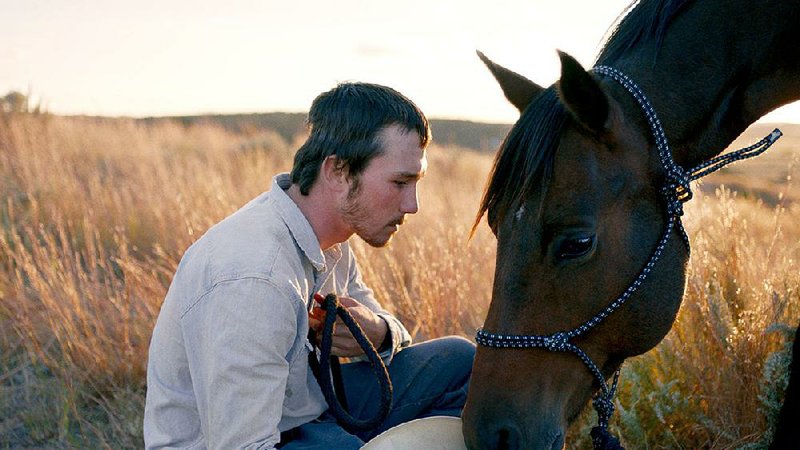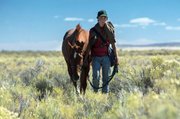TORONTO -- Growing up in rural New York, my family lived in a country house with a decent amount of acreage, and a separate barn out in back. It was only natural, then, that my sister, a dedicated "horse loon," would begin a constant assault on my parents to acquire one. Eventually, they relented, and one blizzard-strewn weekend we drove down to New York to pick up Mir, a retired police horse with a sweet disposition and a somewhat crafty sense of humor.
After getting bucked off of him one too many times -- I wasn't much of a rider, it must be said -- I sort of eased up on that part of the horse experience, but I remember spending time with him in his stall, or out on the paddock, putting my hands on his velvety chestnut hide and feeling the tremendous power coiled underneath my small fingers. He was large, incredibly powerful, but also gentle, strength contained by a kind of civil restraint. I never had the obsessive reverence of my sister, but I could certainly see how people could fall so deeply enamored of them. A pair of films at this year's Toronto International Film Festival directly speak to the majesty of the equine, and our continued enthrall with them. They also happen to be two of the better films I've seen at this year's festival.
First off is Chloe Zhao's The Rider, a docudrama of sorts, wherein her nonprofessional cast more or less play versions of themselves within the framework of her loosely constructed narrative. Ex-rodeo rider Brady Jandreau plays Brady Blackburn, a once promising rising star having to pick up the pieces after a nasty accident leaves him with a plate in his head -- an injury for which he changes his own dressing by forcibly pulling the staples out and wrapping his skull in plastic wrap -- and a mandate from his doctors not to ride anymore.
The thing is, Brady, who has "that touch" (as one horse owner puts it) with the animals, can't quit them. A sweetly dependable sort by nature, his tenderness with the horses in his care is palpable -- it's what they respond to as well. It's his gift, maybe his only one, he figures, and life without rodeo, and horses, is sort of unfathomable to him. Living with his sloppy drunk, gambling father (Tim Jandeau), and his autistic teen sister, Lilly (Lilly Jandreau), Brady acutely feels the responsibility of having to earn a living, but picking up shifts at a nearby grocery feels tantamount to a prison sentence. In his off hours, he spends his time drinking with his cowboy friends, hanging around the rodeo he can no longer compete in, and visiting his good friend and mentor, Lane Scott (Lane Scott), another former cowboy suffering from severe brain damage after an accident that leaves him unable to walk or speak.
As he lurches around, getting by on drip coffee, pain pills, beer and marijuana, trying to find something to replace the rodeo void in his life -- including training some of the more wild horses in the area -- Brady wrestles with the idea that his life's work will end up being denied to him, a fact that causes him constant pain. Like Mickey Rourke's character in The Wrestler, there is only one thing in the world that feels truly right to him, and that's the very thing he's being denied.
Shot beautifully by Joshua James Richards, Zhao's languid pace allows the camera to rest on the stunning natural beauty around them in South Dakota -- prairies, mountains, elegantly swirling clouds of dust left by horse hooves, while also capturing the gritty, downtrodden verite of the lives of these characters. The young, would-be rodeo stars spend their time drinking and reliving the good ol' days as if they were already played out. In that brutal sport, one that can take a lifetime out of your body in a matter of years, you can be forcibly retired by the time you're 25, and be stuck stocking grocery shelves and wishing for all the world you could climb back into the saddle, damn the physical cost.
Charley Thompson (Charlie Plummer in a star-turn sort of performance) is a different kid with a much different set of needs in Andrew Haigh's Lean on Pete. Growing up with his vagabond father (Travis Fimmel), moving from town to town in the Pacific Northwest every few months as his dad works warehouse jobs all over Washington state, he never gets to stay anywhere long enough to lay down serious roots. A sweet teenager, with some athletic ability, and a calm, nurturing personality, he's left on his own more often than not as his good-time pops takes off with new girlfriends for days at a stretch, leaving him with a few bucks, and little more than a promise to return eventually.
At one such pit stop, Charley connects with the cynical Del (Steve Buscemi), a two-bit racehorse owner, who lashes out in profanity-laden tirades at everyone and drives his ponies into the ground in the process. He agrees to take Charley on as a protege of sorts, which gives the kid some sense of belonging and focus, as well as putting a bit of money in his pocket. When his dad gets seriously hurt, however, Charley has almost literally nowhere else to go but the stables. He has an aunt he remembers fondly from years ago, but can't track down where she has moved anymore specifically than somewhere in Wyoming.
In the process, Charley becomes friendly with the titular Pete, a docile 5-year-old Arabian, whose losing ways lead Del to try and send him off down to Mexico, where he will surely be slaughtered. Rather than lose his only consistent friend, Charley takes off with Pete in Del's old truck, in a mad plan to take him to his aunt's place, where he hopes there will be a haven for the them. Let us just say things do not go terribly much according to plan, and before long Charley is living as a homeless vagrant, the last vestiges of his previous conscientiousness being slowly drained and beaten out of him, before he makes one last desperate attempt for sanctuary.
Writer/director Andrew Haigh, whose last film, 45 Years, was also powerfully understated, has a way of burrowing deeply into his characters' psyches without you even recognizing how he's doing it. Charley, who has had to act as his father's parent for years, has a great deal of maturity, but little of the life experience -- and brutal skepticism -- he needs to be able to survive in the harsh outside world. When he befriends Pete, it's not for a heroically romantic reason, he just recognizes in him a kind of kindred spirit that one might recognize in a best friend (when asked if he has ever been on the horse, Charley responds "he's not for riding"), and feels the need to repay that sort of loyalty in kind. Despite the advice he gets from Del, and Bonnie (Chloe Sevigny), one of his primary jockeys, Charley is never able to see the horses as commodities, to be used and spent in service to human livelihood. Their endless service is a means of keeping their owners in enough cigarettes and booze to get through the vacancy of their time on earth. For Charley, as with Brady, the animals become companions with complex, deep relationships that need to be properly respected. Without those relationships, they feel the void in their lives all the more acutely.
Always an elderly horse, Mir died peacefully one spring after my sister had him a few years. I never got to know him the way she did, but I would often imagine him there at his barn, surveying the flat land around him -- so utterly different from the concrete, asphalt and high-rises of the city where he had lived and worked for so many years -- enjoying his retirement, the sound of my sister's boots crunching in the snow as she took him his morning and evening meals. In the end, he got to live out his last years with love and dignity, which, of course, is all any of us can really hope for.
MovieStyle on 09/15/2017

